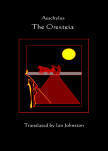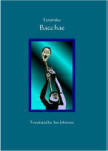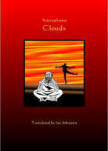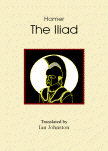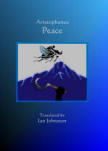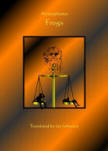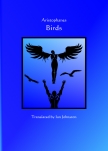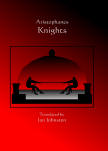Questions? Call us toll free:
1-800-856-3060
Translated by Ian Johnston
Sophocles (495 - 406 BC), the most prolific of the Greek playwrights whose works survive, wrote a number of plays about the family of Oedipus, legendary king of Thebes. Of these plays, the two most popular are Oedipus the King and Antigone.
The Odyssey by Homer
Translated by Ian Johnston
The Odyssey is one of two surviving poems of the fabled poet, Homer, a blind bard who kept alive the feats and darings of ancient heroes and their gods. It comprises one of oldest and finest epic poems in Western culture.
Translated by Ian Johnston
Oedipus the King has long been regarded, not only as Sophocles' finest play, but also as the purest and most powerful expression of Greek tragic drama. In this new verse translation, Ian Johnston captures the compelling tension of Sophocles' drama, the intense poetic vision which has made this play justly celebrated as one of the great masterpieces of Western literature.
read more and see news, reviews & interviews
The Oresteia by Aeschylus
Translated by Ian Johnston
William von Humbolt wrote of Aeschylus' The Oresteia that "among all the products of the Greek stage, none can compare with it in tragic power; no other play shows the same intensity and pureness of belief in the divine and good; none can surpass the lessons it teaches and the wisdom of which it is the mouthpiece."
Bacchae by Euripides
Translated by Ian Johnston
Bacchae holds up a desperate view of human experience, a vision that led Aristotle to call Euripides "the most tragic of the poets." Its first production took place in 405 BC in the annual competition for tragic drama, where it won first prize. It has remained one of the best-known and most frequently performed Greek tragedies ever since, one of the greatest works of classical Greek culture.
Clouds by Aristophanes
Translated by Ian Johnston
The comic drama Clouds (423 BC) is one of the most famous and popular satires ever written. In it Aristophanes, the greatest comic dramatist of ancient times, takes issue with the intellectual and moral depravity of his fellow Athenians, particularly with their thirst for radical innovations in traditional ways of thinking and for their unscrupulous self-interest.
Lysistrata by Aristophanes
Translated by Ian Johnston
Lysistrata, one of the most famous and most popular plays of the great comic writer Aristophanes (456-386 BC), tells the story of how the women from the Greek city states decide to take over the public treasury in Athens and to stop having sex with their husbands until the men agree to stop fighting a destructive civil war.
The Iliad by Homer
Translated by Ian Johnston
The Iliad is the oldest and finest epic poem in Western culture. This book contains a new translation by Canadian Professor Ian Johnston. It has been translated from the original Greek into a modern English poetic form and was designed first and foremost for those who will be reading Homer's Iliad for the first time.
The Odyssey Abridged by Homer
Translated by Ian Johnston
Ian Johnston's abridged version of this magnificent poem, approximately one third the length of the original, is based upon his acclaimed new translation of the entire work. Every line in the abridged text comes from Homer's poem, and a few short summary comments are included to keep the narrative thrust of the action coherent.
The Iliad Abridged by Homer
Translated by Ian Johnston
Ian Johnston's abridged version of Homer's great poem is based upon his acclaimed translation of the complete epic. The abridged text is approximately one third of the original and presents a coherent narrative poem in which every line is taken from Homer's text, with occasional short summaries to keep the story coherent.
Philoctetes by Sophocles
Translated by Ian Johnston
The story of Philoctetes, a warrior leader on the Greek expedition to Troy, has long been a favourite of writers and visual artists. Wounded by a snake bite on the journey to Troy, Philoctetes was abandoned on a deserted island by the Greek leaders, because the smell of his wound and his cries of pain prevented the other leaders from carrying out their duties...
Ajax by Sophocles
Translated by Ian Johnston
Sophocles (c. 496 BC to 406 BC), the great Athenian tragic dramatist, wrote Ajax early in his career, perhaps around 440 BC. It is one of the seven plays which survive from the more than one hundred and twenty plays Sophocles wrote. Ajax presents the story of the final day in the life of one of the most glorious heroes from the world of the Iliad, the great Ajax...
Peace by Aristophanes
Translated by Ian Johnston
Aristophanes (ca 446-386 BC), the most famous writer of Old Comedy in Classical Athens, wrote Peace during the Peloponnesian War (the work was first produced in 421 BC). In the play he makes a passionate, lyrical, and nostalgic plea for peace between the warring Greek states. The play is justly famous, not merely for the usual Aristophanic blend of robust humour and vitriolic satire....
Medea by Euripides
Translated by Ian Johnston
Euripides' Medea, has long been considered one of the great masterpieces of classical Greek drama and has attracted attention in modern times as one of the first great works of feminist drama. The play pits Medea, a murderously passionate barbarian princess, against her husband, Jason, the leader of an expedition of Greek heroes who set out to capture the fabled Golden Fleece.
Frogs by Aristophanes
Translated by Ian Johnston
Euripides' Medea, has long been considered one of the great masterpieces of classical Greek drama and has attracted attention in modern times as one of the first great works of feminist drama. The play pits Medea, a murderously passionate barbarian princess, against her husband, Jason, the leader of an expedition of Greek heroes who set out to capture the fabled Golden Fleece.
Birds by Aristophanes
Translated by Ian Johnston
The Birds has long been hailed as one of the finest masterpieces written by Aristophanes (ca. 456 BC - ca. 386 BC), the greatest of all classical Athenian comic dramatists. First performed in 414 BC, at the height of the Peloponnesian War, which pitted Athens against Sparta, the play celebrates the extraordinary character of Athens in a manner that is at once robust, lyrical, satiric, and full of ironic resonance.
Knights by Aristophanes
Translated by Ian Johnston
Knights by Aristophanes (c. 446 to c. 386 BC ), the greatest writer of Old Comedy, is a bawdy, incisive, and evocative satire on Athenian political life during the Peloponnesian War. The play is a fierce and sustained attack on one of the most popular politicians of the day, the pro-war demagogue Cleon, who had prosecuted Aristophanes for one of his earlier works...
At Richer Resources, we are dedicated to the creation of high quality books, art and other media intended to enrich the lives of individuals of all ages.
As an independent publisher, we are bound by a sense of integrity and quality to produce products which enhance the lives and vision of individuals everywhere.
Sign up to receive notice of free eBooks, new releases and special subscriber-only offers.
(You can unsubscribe at any time)



